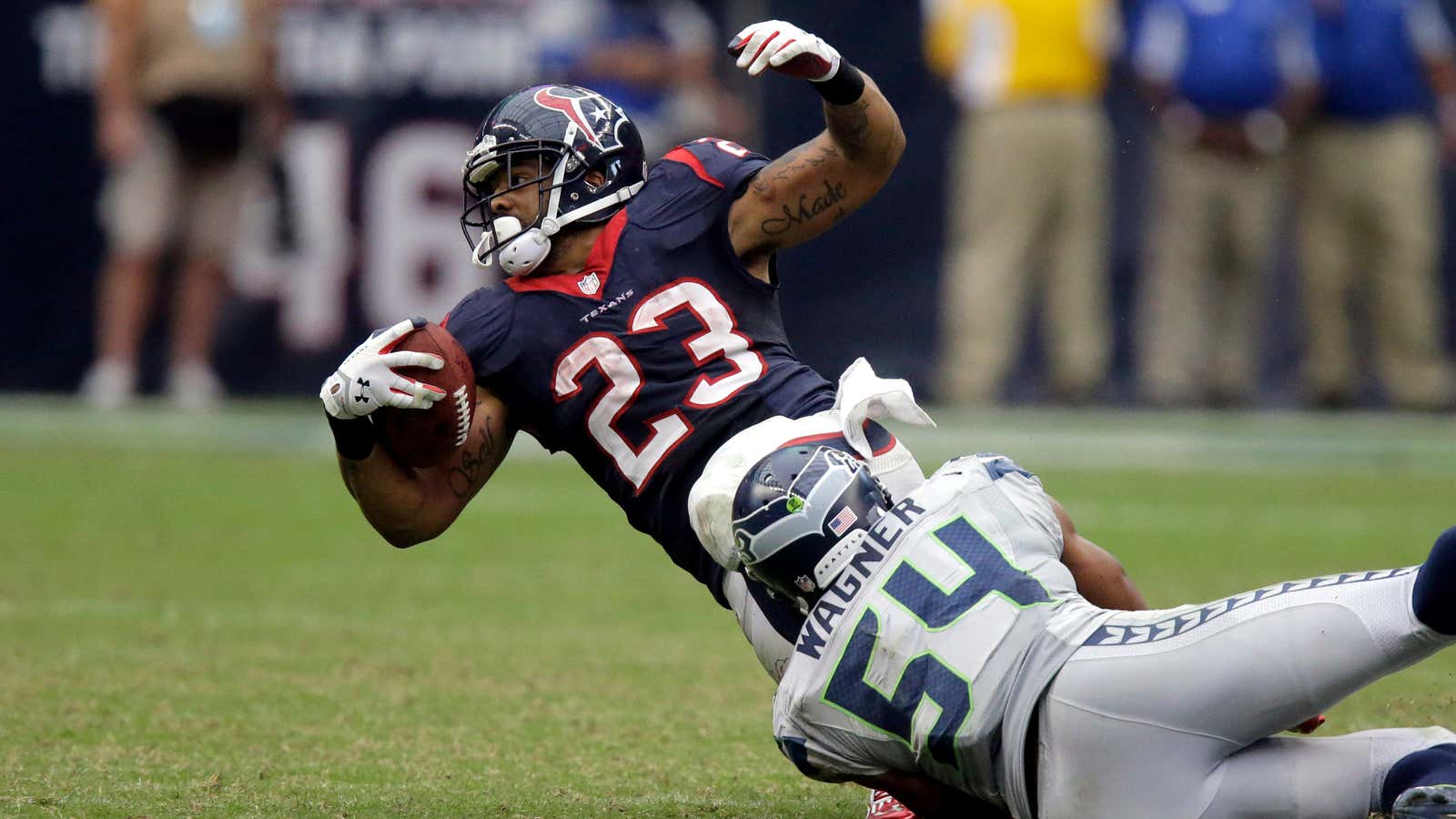Arian Foster is the smartest guy in the room. He’s an American football player who’s convinced a start-up to pay $10 million for 20% of his future income—and there’s little chance he’ll make enough money for the firm to recoup its investment.
That’s not stopping a group of Silicon Valley veterans taking advantage of newly loosened securities rules from asking you, potential investor, to buy stock and fund the deal, which it hopes to repeat with other famous athletes. This is probably not the kind of ”emerging growth company” the US legislators who drafted the JOBS Act had in mind.
“Third-party ownership”—purchasing a minority stake of an athlete’s future contracts—is new to the United States. It’s not new to the world, particularly in the free-market world of international soccer, which doesn’t have the same cartel-driven collective bargaining agreements that dominate big American sports leagues. Teams will pay tens of millions of dollars to other franchises just to purchase player contracts, on top of the salaries they pay the players themselves, and investors have occasionally stepped in to help clubs afford those contracts—and to benefit when those contracts are sold again.
This summer, for example, Barcelona Football Club paid €57m to the Brazilian club Santos for the rights to sign their star player, Neymar. An investment fund who bought a share of his contract in 2009 for the equivalent of $2.6 million received €6.84 million ($8.9 million) as part of the deal—a pretty nice return. But soccer’s global governing body is trying to crack down on the practice, worried about the potential for foul play.
Nonetheless, a US company called Fantex is attempting a similar play. It’s created a platform to purchase shares of players’ brand income, including salary, endorsements and investment opportunities, with up-front payments. Foster is the only player on the Fantex roster, and if it succeeds in its plan to sell $10 million in equity, he’ll be the main beneficiary. For Fantex and its investors to break even, Foster will need to earn at least $50 million for the rest of his life, paying the company back in quarterly installments.
Will he do it? Under his current contract, Foster can earn a maximum of $25.5 million in the next four years playing in the NFL, and $383,000 and $455,000 of endorsement fees in 2013 and 2014. Even assuming that Foster doesn’t get injured and continues earning half a million each year in endorsements, he’ll still be short a good $20+ million toward Fantex’s break-even earnings. That’s why the whole deal is dependent on Foster earning a second big contract in 2017, when he is 31 years old. Foster is talented, but there aren’t a lot running backs who wind up getting a significant paycheck at that age because of widespread injury and declining performance.
It’s possible, of course, that Foster will have a sudden explosion in endorsement pay or earn big paychecks as a TV commentator or find himself in the position to purchase a sports franchise like basketball great Magic Johnson, but that’s a big bet on one player. Fantex no doubt hopes to diversify its player portfolio in the hopes that one of its stars will really take off, subsidizing other losses, and to make money on commissions paid by fans trading athletes’ “brand stock” on its platform.
But even Fantex’s success doesn’t mean that fans investing in the business will come out on top. Equity in Fantex will entitle fans to ownership of a “tracking stock” pegged to Foster’s value, and the ability to trade it in a marketplace created by Fantex, which will take a commission on all sales. As Reuters’ Felix Salmon points out, individual investors aren’t necessarily exposed to diversification or even dividends from Foster’s income, and the company has every chance of going bust.
Salmon also notes how it might seem exploitive for a bunch of middle-aged white men to essentially purchase a 20% tax on a 27-year-old black football player. While the vibes are unnerving, we think Foster—known as much for his off-field intellectualism as his on-field dominance—might have the last laugh. Look at it this way: Foster is only guaranteed to receive about $10 million more in the next four years for his contract; the rest depends on his health and performance. In a volatile business, it might be sensible insurance to take an additional guaranteed $10 million from private investors, especially if you are unlikely to pay it back in full.
